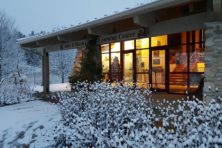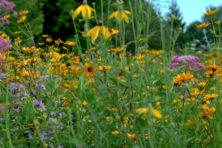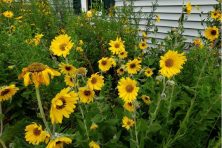Reasons to Consider Native Plants in Garden Plantings
- Share
- Tweet
- Pin
- Share

By Karen Newbern
Door County is blessed with an amazing variety of natural communities – hardwood forests, conifer swamp, open meadows, limestone bluffs, and sand dunes. Within each community there are distinctive plants that have adapted to the particular environmental conditions of that habitat. These beautiful natural landscapes display authentic Wisconsin flora – and home gardens can too. Just add a few native species (or a lot), and introduce some of the county’s natural beauty and diversity to your yard.
Generally, plants that were present prior to European settlement are considered native. They are the plants – mosses, ferns, flowers, trees, grasses and shrubs – that evolved together in forests, wetlands, prairies and aquatic systems.
But why use native plants instead of the numerous ornamentals that are available at every garden center and big-box store? Here are just a few reasons to consider.
- Compared to typical home landscapes, native plantings are low-maintenance. Once established, they don’t require fertilizer or irrigation, are more resistant to pests and diseases, and don’t need to be mowed every week.
- They are better adapted to survive summer heat and frigid winters because they evolved in local environmental conditions.
- Natives provide food and shelter for birds, mammals, butterflies and countless other insects. Many horticultural varieties have beautiful flowers, but actually produce less pollen and nectar than their native counterparts.
- Many natives, especially trees and shrubs, can provide year-round beauty: flowers and/or berries in spring and summer, brilliant foliage in fall, and colorful or textured bark in winter.
- Natives provide a variety of environmental benefits. Natural plantings help to filter rainwater and control erosion, and less use of lawn maintenance equipment reduces air pollution.
More information about the benefits of native plantings is available at WildOnes.org.




